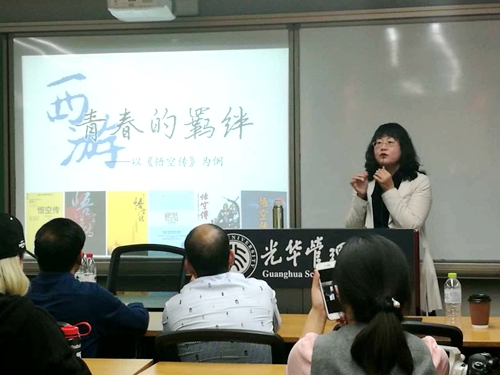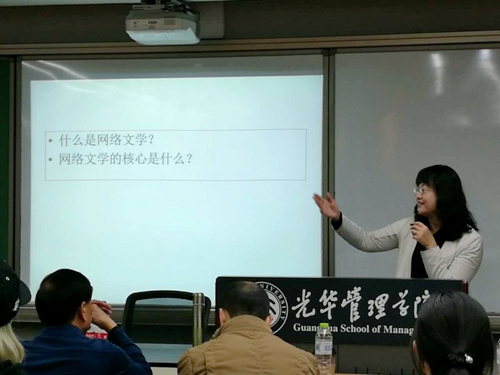Peking University, December 1, 2016: On November 27, Shao Yanjun, associate professor of Department of Chinese Language and Literature, was invited to the 15th Bowen Forum of Guanghua School of Management as a guest speaker. She shared her views on the topic of Literature Transition in the Internet Age.

Associate professor Shao Yanjun delivering a lecture
Online literature in the eyes of ‘scholar-fans’
‘Scholar-fans’, according to Will Brooker, refers to someone “in theory at least combines personal passion with the objective analysis of scholarship.” As for associate professor Shao Junyan, she is not only a serious scholar, but also a passionate fan. She has also been the hostess of PKU Critical Forum on the Latest Contemporary Works and the editor of PKU Annual.
Shao mentioned that she was a big fan of Mao Ni, a popular online writer. She follows Mao Ni’s new posts on Weibo, reads feedbacks from fans and participates in discussions from time to time. She said it was being Mao Ni’s fan that offered her an ‘invitation’ to the discussion of online literature.
As a senior “Scholar-fan,” Shao preferred to define online literature as “New Media Literature,” rather than “Popular Literature.” She argued that internet not only allows literature to spread widely, but also offers a platform for authors to produce more works. Shao said that online literature had the characteristics of being accessible, participative and interactive.
“Wuxiang World” is rising; China’s online literature has a promising future
Founded by a passionate fan of wuxia novels in 2014, “Wuxia World” rose quickly to prominence as the largest Chinese-to-English novel translation platform in the world. It is ranked by Alexa as one of the top 1500 websites in the United States and has over 500 thousand page views per day.
Why does China’s online literature have a promising future at home and abroad? Shao said that it is probably owed to the popularization of World Wide Web. With more and more Chinese readers exposed to foreign online books. Many Chinese writers are attracted to these foreign books, which in turn motivate the development of China’s online literature. Besides, compared with strictly-regulated publishing world, there are less restraints on web-based writing, which also explains the thriving of Online literature.
The Lecture
Zeitgeist—paradigm and transcendence in an age of online literature
Shao discovered one important trait of Chinese online literature: Zeitgeist. Shao argued that on one hand, contemporary online literatureshowed each writer’s own distinctive style; on the other hand, it also reflected the zeitgeist, or the anxiety and values, of the era.
In Shao’s Weibo page “PKU Online literature Forum,” how zeitgeist is conveyed by online literature is discussed. For instance, female-oriented novels like BuBuJingXin (Treading on Thin Ice) and Hougong: Zhenhuanzhuan (Concubines in the Palace. A biography of Zhen Huan) show women’s spiritual crisis and their loss of faith in love, while the fantasy novel Jiangye attempts to rebuild Chinese people’s faith in an age of cynicism.
Although online literature has been accepted by numerous young readers, it is stillon its way to maturity and perfection and needs to learn from traditional literature. Shao believes that in term of literature transition in the Internet age, Chinese online literature still has a long way to go.
Written by: Li Xiaotong / Su Lan
Edited by: Xu Liangdi / Xu Penghang

